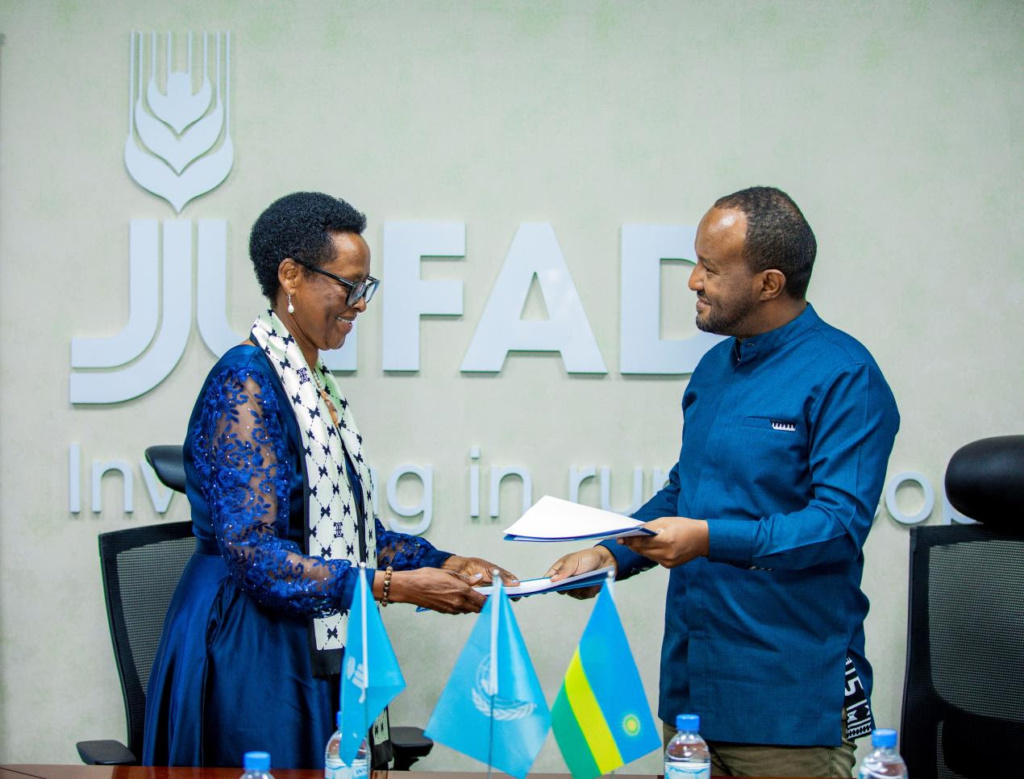
NGABO Syndicate Farmers, a producer organization and the UN’s International Fund for Agricultural Development (IFAD) signed a US$2 million project to enhance food security, improve livelihoods and build climate resilience for over 100,000 cassava farming households across 10 districts in Rwanda. Women will make up more than half of the participants, and almost one in five will be young farmers.
“Small-scale farmers are the backbone of Rwanda’s food system, and their resilience is critical to our nation’s food security. This project recognizes the vital role of these farmers and their organisation and empowers them with the knowledge, tools, and resources they need to thrive. By improving production, enhancing market access, and building resilience to climate change, we are not only increasing food production but also strengthening the livelihoods of thousands of Rwandan families,” Said Kantarama Cesarie, the President, INGABO Farmers’ Syndicate.
“This project is timely and exemplifies IFAD’s commitment to supporting sustainable and inclusive food systems,” said Dagmawi Habte-Selassie, Country Director, IFAD Rwanda. “By investing in smallholder farmers, we can enhance food security, build resilient rural communities, and contribute significantly to Rwanda’s economic growth. The specific interventions in post-harvest systems and market linkages will support a sustainable cassava value chain.”
The four-year initiative, known as SCORE Rwanda (Strengthening Smallholder Farmers’ Resilience to (Food and Climatic) Crises for Improved Food Security and Livelihoods in Rwanda), is funded by the Global Agriculture and Food Security Program (GAFSP) Producers’ Organisation Funding window, Agriterra an organisation specialising in cooperative development, and Eastern Africa Farmers Federation (EAFF); and IFAD will supervise the implementation by INGABO.
Cassava, an asset for Rwandan farmers
Agriculture is the backbone of Rwanda’s economy, accounting for 27per cent of its national GDP and employs 64.5 per cent of the total population.
Cassava, cultivated on roughly 147,320 hectares, equivalent to 5.6% of Rwanda’s territory, is a vital crop to ensure food security, ranking second in production after bananas. This tuber crop sustains over 700,000 families, particularly in the drought-prone southeast.
While a significant portion of cassava is consumed domestically, limited value addition restricts its export potential. However, its resilience to climate stress, such as low rainfall and poor soil conditions, makes the tuber crop an asset for Rwandan farmers.
Increasing and more frequent droughts, floods, and rising temperatures connected to climate change have led to poor harvests, worsen food insecurity, and malnutrition in Rwanda. The project aims to help farmers adapt to the new climatic reality by improving cassava production, utilizing clean and improved seeds and promoting the Zai Pit technique an improved farming method that improves soil fertility and water retention in degraded soils. In addition, the project will also promote Good Agricultural Practices (GAP), which guide farmer’s activities and Post-Harvest Handling and Storage (PHHS) methods.
To safeguard these gains, the project will also build the farmer’s resilience by raising awareness, providing training on climate change adaptation strategies, disseminating climate-smart technologies, promoting the use of early warning systems, and advocating for soil health and water conservation methods.
As a farmer-led organisation, INGABO will play a crucial role in ensuring project sustainability. The project will strengthen the organisation’s capacity and member cooperatives through improved project management, knowledge management, and monitoring & evaluation systems.
The initiative will strengthen the links across the cassava value chain that offers new job opportunities to women and young people, especially through better access to financing.
The project will directly benefit smallholder farmers in 10 districts: Kamonyi, Muhanga, Ruhango, Nyanza, Gisagara, Nyamasheke, Rusizi, Bugesera, Gatsibo, and Kayonza.








